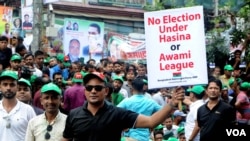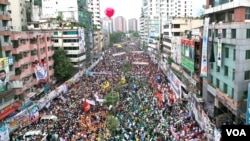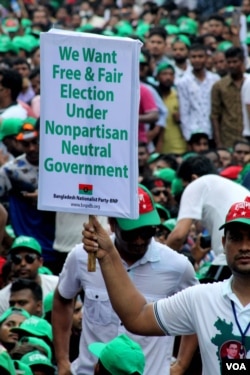Bangladesh’s opposition BNP is expected to stage new protests Tuesday and Wednesday amid its call for the resignation of the current government and installation of a caretaker administration ahead of general elections likely taking place in January.
Word of the protest comes as the BNP, or Bangladesh Nationalist Party, and other activists allege Prime Minister Sheikh Hasina’s government has been fast-tracking pending police cases against some of the opposition leaders to prevent them from running in the elections. An antigovernment protest was held last Wednesday.
The Awami League, or AL, is the ruling party.
On July 6, a deputy inspector general, or DIG, of police met with other senior police officials in Dhaka and authorized an initiative to gather data on the cases of the leaders and activists from the BNP and another opposition group, the Jamaat-e-Islami Bangladesh party, known as Jel.
Members of these groups have been facing charges of arson, violent attacks on police, various subversive activities and other serious crimes, since 2013.
VOA received a copy of the minutes of the meeting from a pro-democracy activist group in Bangladesh. Copies were circulated by the activists among most media outlets in Bangladesh, too. Fearing reprisals from police, most of the outlets overlooked the issue. Self-censorship has been common during this Hasina-led government’s time in office. Several journalists have faced repercussions under the country’s Digital Security Act for writing reports against the government or ruling party.
However, The Daily Star, Bangladesh’s largest English language newspaper, and New Age, another English language daily, reported the details about the minutes.
Police have not raised any protest against the two newspapers for publishing the details of the minutes. Additionally, they have not conducted a press conference calling the minutes false.
Most of the trials in the cases against the opposition leaders and activists have been taking place for many years. In many cases, the prosecution has failed to present sufficient evidence. In South Asia, it can take 10, 20 or more years for such cases to be settled.
According to the leaked minutes, at the meeting chaired by Joydeb Bhadra, the deputy inspector general of police, senior officers were allegedly directed to focus on cases targeting accused BNP and JeI leaders — especially those who are expected to contest the next general elections.
The minutes were in Bengali.
“A special emergency meeting in connection with the speedy investigation, trial and disposal of police cases of arson, serious crimes and killing of police personnel, since 2013,” the subject of the minutes read. According to the minutes, the president or chairman of the meeting was the deputy inspector general (crime management) of police.
Introductory statement by the chairman
“ … On the issue of elections, the government is under international pressure. By any means, the government has to win the election. BNP and Jamaat have to be declared disqualified for the election. ... All BNP and Jamaat leaders who are expected to contest elections are accused in some cases. If their trials, convictions and punishments are ensured quickly [by September 2023], they will be declared disqualified from taking part in the elections. Every Thursday after 5.00 p.m., I will meet the law secretary to ensure issuance of directives — where and what exactly are needed — for the judges, to ensure conviction [of the opposition leaders].”
The police officers were allegedly instructed to maintain “good rapport” with public prosecutors and judges to ensure quicker trials and the disposition of the criminal cases. Police were also allegedly told to file regular “status updates” on the selected cases.
Past reports have cited examples of the judiciary colluding with the government or ruling party.
In Bangladesh, it has long been alleged that the judiciary and police work in support of the ruling party or Hasina-led government. Additionally, Human Rights Watch and other rights groups allege that the police have taken a heavy-handed approach toward opposition leaders.
Bhadra did not respond to requests sent by VOA on the Facebook Messenger app on queries related to the July 6 meeting. The Bangladesh Ministry of Home Affairs, which controls the police wing, has not responded to requests for comment either.
The BNP boycotted the general elections in 2014. Four years later, elections were marred by allegations of massive rigging by the Awami League — a charge Hasina repeatedly denied.
The opposition has long alleged that Awami League activists stuffed the ballot boxes the night before the 2018 elections.
Since 2022, the United States and other countries have urged the Hasina government to hold the next general election in a free and fair manner. To promote free, fair and peaceful elections, U.S. Secretary of State Antony Blinken in May announced a new policy that restricts visas for Bangladeshis who are believed complicit in undermining the democratic electoral process at home.
Demand for installation of caretaker government
The BNP has maintained that Awami League should step aside before the next general elections take place. In the past few months, however, several of its senior leaders have rejected opposition calls to step down to make room for a caretaker administration.
Referring to the July 6 police meeting, BNP vice chairman and former member of parliament Barkat Ullah Bulu said that the leaked minutes have exposed the government’s conspiracy against the BNP. Bulu said he received a copy of the minutes from a media outlet.
“When a senior police officer says that ‘by any means, the current regime has to win the next general elections,’ and judges would be instructed to ensure [the] conviction of BNP leaders, one can understand how this government is resorting to corruption to ban our party from the election,” Bulu told VOA.
Mirza Fakhrul Islam Alamgir, the BNP secretary-general, said that his party will stay away from the election if it is held under the Awami League-led government.
“It is utterly pointless to take part in rigged elections where the party goons intimidate the voters, rig the result, stuff the ballot boxes [the] night before the elections. They have politicized all the government institutions including the election commission, the police and the judiciary,” Alamgir told VOA.
“There is no level playing field for the opposition to take part in a meaningful election.”
His party would take part “only if a nonpartisan caretaker government” is in place, he said.
Badiul Alam Majumdar, founder of Citizens for Good Governance, a pro-democracy activist group in Bangladesh, said, “You cannot call it an election” if there is no alternative candidate competing against the ruling party candidate.
“And if, the revival of these cases and expeditious disposal of these cases means that the opposition candidates would not be able to compete, then that will not be an election. It would be a one-sided election. And a one-sided election is no election at all,” Majumdar told VOA.
Ali Riaz, professor of political science at Illinois State University, told VOA, “The absence of a neutral government during the election provides the opportunity to manipulate an election.”
Referring to the past provision of the election-time caretaker government, which was scrapped from the constitution in 2011 by the Hasina-led government, Riaz said Awami League changed the constitution “without the explicit consent of the citizens and used it as a ploy to ensure another stage-managed vote.”
“If it wanted to have an environment wherein the citizens could deliver their verdict, it wouldn’t be afraid of holding it under a neutral government,” he said.
"The Awami League won two elections under the caretaker system. Therefore, it cannot claim that the caretaker system doesn’t deliver a result reflecting the will of the people."








